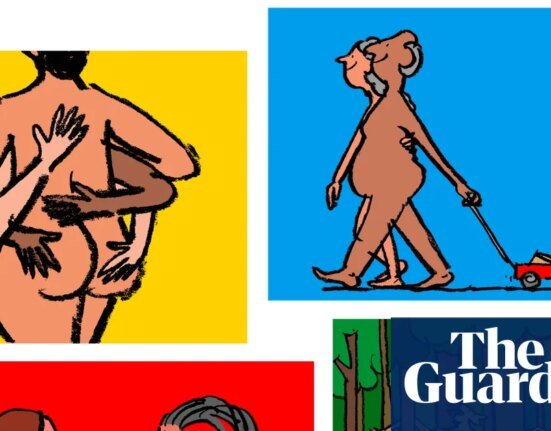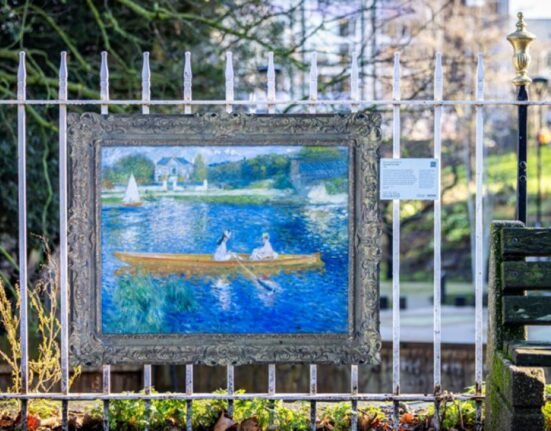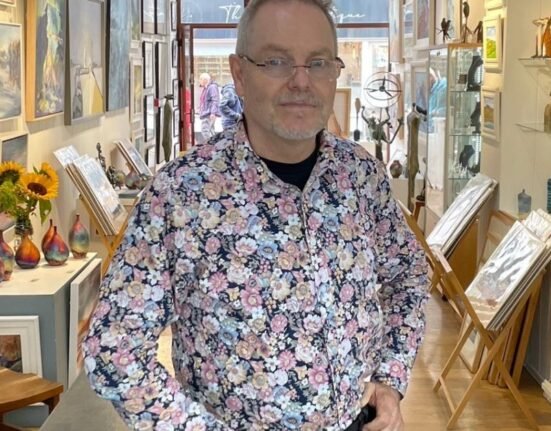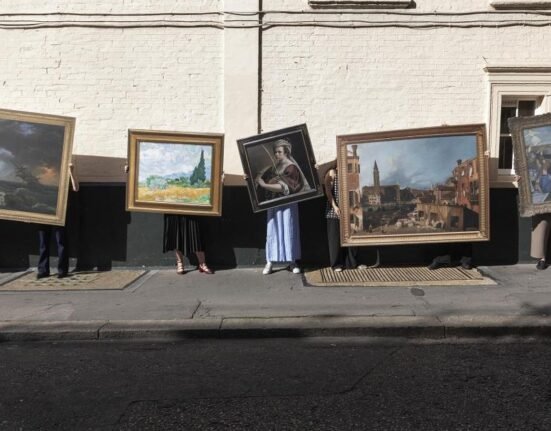“TRY taking a picture with your phone camera and zoom in,” says our guide as we crowd around a piece of chewing gum stuck on the pavement, squinting to see it better.
Sure enough, when I pinch and stretch the photo on my phone screen, I can make out a kitchen scene, with a tiny kettle and three-point plug.
By painting on to blobs of trodden gum instead of anything more permanent, artist Ben Wilson keeps within the confines of the law here in Bristol, explains Luke, our guide.
I’m on the Blackbeard to Banksy walking tour, a street-art amble which crams in 1,000 years of history into two hours.
We go from miniature to massive as further along, Bristol’s tallest murals loom down from tower blocks on Nelson Street.
There’s the giant figure of a banker in pin-striped suit and bowler hat, pouring red paint down the side of a tower block and mother and baby, like a modern vision of the Madonna and Child, on the building next to it.
If you’re wondering how anyone got away with spray painting on this scale well, they didn’t.
These works were created with the council’s blessing as part of a street art festival in 2011.
Today the city’s colourful urban art is celebrated as a star attraction, but the authorities haven’t always seen it that way.
Drinking hole
Before he was quite so famous, Bristolian graffiti artist Banksy went under cover — quite literally — to escape the attention of council workers at their desks in the offices opposite.
He put up a scaffold and tarpaulin to stencil his 2006 work, Well Hung Lover, on to the side of a building in Frogmore Street.
In a cheeky jibe at the oblivious city officials, it shows a suited man searching out through a window, flanked by his wife, while her naked lover clings to the ledge undetected.
As well as art, our walking route also takes in historic pubs where pirates like Blackbeard once plotted, including Bristol’s oldest drinking hole, The Hatchet Inn, dating back to the 1600s or earlier.
Gruesome urban legend has it the front door is covered in the skin of hanged criminals underneath the many coats of black paint you see on it today.
Then, winding our way back towards the present day, we stop by the empty plinth from which Black Lives Matter protesters toppled the statue of slave trader Edward Colston in 2020 before dumping it in the dock.
Now you can find the bronze figure lying ingloriously on its back, still tainted with red paint at M Shed museum (free to visit).
The artistic fun doesn’t end there, though.
I check in to Mercure Bristol Grand Hotel, a Grade-II listed late-19th century building, which is a stunning landmark in its own right, with its beautifully-ornate wrought-iron and stained glass porch.
Inside, it’s bright and modern with original work by street artists.
St Nicholas Market is around the corner and a great place to pick up gifts and grab a bite to eat from one of the enticing food stalls.
Or head to Chez Marcel on Broad Street, a few doors down from the hotel, which serves savoury and sweet crepes.
The crepe complete (ham, emmental and egg) washed down with a dry Breton cider is just as delicious as any I’ve had in France and all for less than £20.
It’s a city where you can travel the world with your taste buds and sample a different country’s cuisine at every meal.
At Sri Lankan mini-chain Coconut Tree, I try cheap and cheerful small plates including “hoppers” — bowl-shaped pancakes filled with coconut and onion relish.
And at upmarket Indian restaurant Nutmeg in Clifton, I have roast duck in a spiced creamy coconut sauce.
For cocktails, Cargo Cantina, in a harbour-side shipping container, mixes a mean Mexican margarita and Cafe Cuba in Stokes Croft has mojitos that are bursting with fresh mint.
With top-notch food and drink, pirate pubs and art around every corner, what more could you want from a city break?
GO: Bristol
STAYING THERE: Standard double rooms at the Mercure Bristol Grand are from £103 and buffet breakfast is from £16.50.
See all.accor.com.
OUT & ABOUT: The Blackbeard to Banksy walking tour is £12 for adults and £5 for children aged 12 and under.












